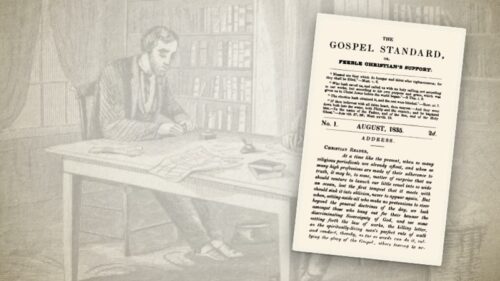-
18 Bible Doctrine – How Does Paul’s Teaching In Romans 9 Align With God The Father’s Role In Salvation?
A Transcript Of The Video Study In our previous study, I unfolded for you the structure of Paul’s letter to the Romans. It was my purpose to show you how Paul’s teaching in Romans 9 fits into the letter as a whole. Well, I pointed out that there are four main sections to the letter. It opens with an introduction (1:1-17) and closes with a conclusion (15:14-16:27). In between are the two main sections—First, Paul explains why sinners are under condemnation (1:18-3:18); Second, he explains how sinners are secured salvation (3:19-15:13). Now, with reference to God securing salvation for sinners, there are a further four sections to the letter—the role of God the Son in the work of salvation (3:19-5:21); this is connected with the…
-
17 Bible Doctrine – How Does Paul’s Teaching In Romans 9 Fit Within The Letter To The Romans As A Whole?
A Transcript Of The Video Study In our previous study, we took a snapshot at how the scriptures use the analogy of a potter and the clay to depict the sovereignty of God and the relatedness of the human race to Him. It was concluded that Paul did not use this analogy carelessly, as if any other comparison would have served his purpose all the same. No, rather, he deliberately chose the analogy because it happens to be one of the clearest descriptions of God’s masterplan for the ages—He is the potter, and we are the clay! Now, as we have discovered, the main structure of this framework is outlined by Paul in Romans chapter 9. However, this is by no measure apparent to most…
-
What Is Hyper-Calvinism?
What Is Hyper-Calvinism? This same question appears as the title for an article written by Ronald Hanko for the Protestant Reformed Churches in America (PRCA). You may view the full article here. Hanko admits that his group (PRCA) is often maliciously charged with being hyper-Calvinists, because it rejects the well-meant offer of the gospel. However, he argues the historic definition for hyper-Calvinism[1] is restricted to those who deny the doctrine of duty-faith, rather than those who reject the free-offer. He writes, “Historically, the name has been applied to those who deny that the command of the gospel to repent and believe must be preached to all who hear the gospel.” He goes on to explain: “A hyper-Calvinist (historically and doctrinally) is…one who believes rightly in…
-
16 Bible Doctrine – Can You Expand On The Analogy Of A Potter And The Clay?
A Transcript Of The Video Study In our previous study, I diagramed for you the teachings of Paul as it relates to the masterplan of God for the ages. The diagram is based on a single analogy used by Paul in Romans 9 and 2 Timothy 2—that of a potter and the clay. The question which now concerns us for this study—is it possible to expand on the analogy of a potter and the clay? Yes, that is something I am happy to do for this study. I want you to know from the outset, the analogy of a potter and the clay is not a trivial comparison used by Paul. The apostle did not haphazardly select the analogy as if some other comparison would…
-
Why So Particular?
To be described as being particular about things is not always a compliment. In fact it is sometimes used as a polite put down as much as to say, ‘He’s very fussy’, or ‘She’s hard to please’. This is often the impression given when some Christians, usually Baptists, describe themselves as ‘Strict and Particular’. One can imagine someone new to the phrase wincing slightly at the expression. The picture of an austere old aunt or a disciplinarian teacher might spring to mind. Hair combed, laces tied and sitting quietly. Overly strict and very particular. Strict Of course the real meaning of the term is quite different and has more to do with the historical development of theology in certain churches. Congregations who practise strict communion…
-
15 Bible Doctrine – What Is The Framework Of Sovereign Grace?
A Transcript Of The Video Study The Framework Of Sovereign Grace is a diagram I drew up many years ago in an attempt to illustrate God’s masterplan for the ages. It has actually become the backdrop for my entire teaching ministry, as it broadly outlines the basic parameters of Bible doctrine. In fact, it is within the context of this framework that all fields of knowledge, or departments of academic disciplines, may be understood from a biblical perspective, and therefore this framework serves as the basic construct around which one may develop his/her worldview. For this study, I would like to explain how the Framework of Sovereign Grace was formed. The diagram is based upon a single analogy, used by the Apostle Paul, in Romans…







